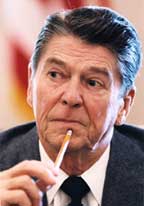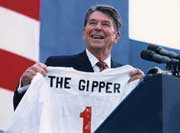June 11, 2004
Copyright © 2004 PUERTO RICO HERALD. All Rights Reserved.
Ronald Wilson Reagan 1911 -- 2004
 On Wednesday, the remains of former President Ronald Reagan returned to a stifling Washington afternoon, a city that, in life, he departed sixteen years ago as a two-term former President and a still vigorous man in his late-seventies. At 69, he had been the oldest man ever to have assumed the Presidency of the United States. On Wednesday, the remains of former President Ronald Reagan returned to a stifling Washington afternoon, a city that, in life, he departed sixteen years ago as a two-term former President and a still vigorous man in his late-seventies. At 69, he had been the oldest man ever to have assumed the Presidency of the United States.
His death at age 93 resulted from a decade long deterioration of his mental and physical condition resulting from Alzheimer’s disease.
As this Herald edition is released, world leaders, U.S. political figures and the men and women that revered him in life gathered at Washington National Cathedral to pay final homage to a man whose personal charm and unshakable beliefs marked him as a memorable political figure. His is the first presidential state funeral hosted by Washington in more than three decades. That was the funeral of former President Lyndon Baines Johnson, Ronald Reagan’s ideological polar opposite.
President Reagan’s incumbency saw the virtual end of the Soviet Union, brought about by his massive defense spending and bold diplomatic initiatives, beginning with his support of the Polish "Solidarity" movement, a strike of shipyard workers that confronted and ultimately toppled the Soviet leaning military government. Lech Walesa, the movement’s leader, eventually became President of a Democratic Poland.
His address in the shadow of the Berlin Wall became the oratorical icon of his Presidency as he challenged Soviet leader Michael Gorbachev to open up his oppressive system. The incantation, "Mr. Gorbachev, tear down this wall" became the slogan for Mr. Reagan’s efforts to force an end to what he termed "The Evil Empire." Puerto Rico Governor Sila Calderon expressed the island’s condolences to the 40th President’s widow, Nancy Reagan, his wife of 52 years and a loving guardian of her husband over the past decade as he slowly declined. In a letter to the former first lady she said, "On behalf of the citizens of the Commonwealth of Puerto Rico, please receive our most heartfelt condolences on the death of your esteemed husband. President Reagan was a man of principle, a visionary, and a true gentleman for whom I will always hold the deepest respect and admiration."
Supporters of Puerto Rico Statehood were encouraged when Ronald Reagan announced his candidacy to run for President in 1980. In his official announcement he stated, "I favor statehood for Puerto Rico and if the people of Puerto Rico vote for statehood … I would, as President, initiate the enabling legislation to make this a reality." In fact, during his eight years in the White House, Reagan did little to advance the aspirations of those wishing to see Puerto Rico’s star stitched onto "Old Glory."
Less than ten weeks into his first administration, President Reagan was shot by a would-be assassin, an incident that shocked the American people and created a national outpouring of sympathy and concern for his welfare. After his recovery, his wit and lack of complaint about an act that nearly took his life greatly enhanced his popularity, leading him to a second presidential term in 1984.
Since his death last Saturday, Ronald Reagan’s flag-draped casket had been viewed by thousands of Americans, both in the library that bears his name in Simi Valley, California, and in the rotunda of the Capitol of the United States, a venue that, as the nation’s 40th President, he dominated by the force of his eloquence and the appeal of his policies, especially to his fellow Republicans and those who welcomed his conservative domestic agenda and his uncomplicated world view. Many of the world leaders who attended his state funeral now lead free nations which were under Soviet domination when Reagan first assumed the Presidency.
At the end of today’s state funeral, his remains will be returned to Simi Valley for private burial.
In this week of national commemoration, the world press is inundated with expressions of admiration for Ronald Reagan’s accomplishments and for his life that encompassed the great depression of the 1930’s, the Second World War, armed conflicts in Korea and Vietnam, the "Cold War" and national political instability caused by the Watergate scandal of the nation’s 37th President, Richard Nixon, a Republican who resigned while facing certain impeachment. A large part of President Reagan’s appeal among Republicans was his role in helping redeem their Party’s reputation from the disgrace caused it by the Nixon administration’s arrogance and lies.
Born in Illinois, Reagan followed the American Westward migration of the 1930s to California, there to establish himself as a successful actor and man of liberal political views, professing himself to be an admirer of wartime Democratic President Franklin Delano Roosevelt. He was voted President of the Screen Actors Guild in the 1950s, and it was the effort by Communist elements to take over that trade union that eventually turned him towards a conservative world view and eventual supporter of arch conservative and vitriolic anti-Communist, Arizona Senator Barry Goldwater.
In 1966 he was elected Governor of California and, in 1970, re-elected to a second term.
A man of personal charm and unambiguous political positions, Ronald Reagan was praised by his contemporaries as a tough opponent, a gracious winner and unperturbed occasional looser in the political infighting of Washington. Contemporaries spoke of his persistence, his optimism, and his deeply held aversion to government interference in the lives of its citizens. Conversely, he was a disappointment to those who saw his dismantling of government social programs for the disadvantaged as mean-spirited in a country blessed with abundance.
Civil Rights leaders saw his embrace of the "states rights" agenda of the Deep South as an implicit endorsement of racial segregation and his complaints about court ordered busing of Negro children to formerly all-White schools as repudiation of the Supreme Court’s mandate to achieve public school integration with "all deliberate speed." Consequently, Ronald Reagan enjoyed very little political support among African American and Latino voters, except for Cuban Americans who embraced his anti-Communist and anti-Castro policy.
 Because of his popularity and personal appeal, criticism of his presidency has been muted during this time of mourning and recognition of his exemplary life. Because of his popularity and personal appeal, criticism of his presidency has been muted during this time of mourning and recognition of his exemplary life.
Ignored is the cloud that hung over his administration’s second term as a result of the "Iran-Contra Scandal," an effort by his administration to provide arms to one of the United States’ then intractable enemies, Iran. The scheme was to obtain secret money from that government to finance a resistance movement against the leftist government of Nicaragua. Congress had ended support of that initiative, making any administration effort to fund it an illegal act. Additionally, arms’ trading with Iran was a "de facto" violation of law.
Reagan avoided impeachment, claiming ignorance of the diversion of funds and issuing a public apology, but 14 persons in his administration were charged with criminal violations by independent counsel Lawrence E. Walsh, including Secretary of Defense Casper Weinberger. All were convicted, except for one CIA official whose case was dismissed on national security grounds and two officials who received pre-trial pardons by Reagan’s successor, President George H.W. Bush. Two other convictions were reversed on appeal, while nine individuals pleaded guilty to a variety of criminal counts.
During the week-long period of mourning, however, criticism of the nation’s 40th President was rare. It was his accomplishments that were chronicled by both political allies and opponents. Perhaps the most moving of tributes came from Mrs. Nancy Reagan, whose earlier interview with Time Magazine was released on the Monday after her husband’s death. She spoke of him as "a man of strong principles and integrity. I think they broke the mold when they made Ronnie."
This week, Herald readers may assess Ronald Reagan’s legacy as a figure in 20th Century U.S. political history.
Please vote above!
|

